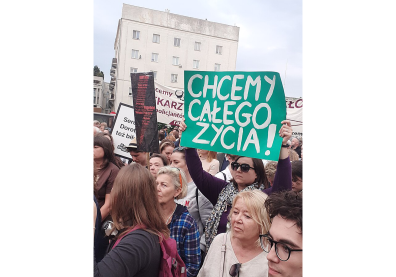Claiming women's rights again and again

The CREE and the CEFRES in collaboration with the Groupement de Recherche "Connaissance de l'Europe médiane" (GDR 3607, CNRS) present the study day "Claiming women's rights again and again".
The scientific event will be held between Prague (at CEFRES), Paris (at Inalco), and in hybrid (Zoom) - to receive the link, write to View e-mail.
Language: English and French
Please note: this event is closed to the public
Scientific event presentation
The so-called "Middle European" region is relatively low-profile in the landscape of "historical" feminisms, despite the wealth of women's struggles attached to trajectories of national construction since the 19th century. It also appears both temporally and ideologically out of step with historiographies of 20thth century feminisms, which mobilize the concept of "waves" and privilege the perspective of Western activists. Moreover, during the socialist regimes, this region experienced exceptional forms of political experimentation in gender equality, which were dismantled and denounced in the 1990s, followed by the massive import of "gender mainstreaming" watchwords carried by democratization and Europeanization programs. Finally, more recently, Eastern European societies have been shaken by the "anti-gender" offensives of "illiberal" governments, in the face of which women have amply mobilized.
Arising from very recent and, in some cases, ongoing work, the 5 scheduled talks offer detailed case studies for analyzing gender regimes in medieval Europe, each from a different disciplinary perspective and on the basis of national contexts as contrasting as Poland in the 20the and 21ste centuries, socialist Yugoslavia, Romania and the Czech Republic in recent decades. Guests will address structural constraints and modes of contestation of inequalities imagined by women in their historically situated practices, be they activist, intellectual, bureaucratic or expert.
This will include local micropolitics giving rise to "women-friendly" measures within the socialist state during the 1970s in Yugoslavia; the professionalized and internationalized activism of groups defending women's rights in the interstices of Romanian and European bureaucracies during the 2010s ; public stances and broad mobilizations by Polish feminists to denounce conservative policies and impose changes to laws restricting their rights; finally, social scientists involved in negotiating normative projects to bend the unequal configurations produced by the liberalized Czech welfare state.
Scientific event program
9:30am-9:40am: Introduction, Ioana Cîrstocea (CNRS, CESSP Paris and CEFRES Prague)
9:40am-10:10am: Hélène Martinelli (ENS de Lyon and CEFRES Prague) and Mateusz Chmurski (Sorbonne Université and CEFRES Prague):"History anthology: Devenir-sœur. Landmarks in a century of Polish feminism"
10:10-10:40am: Chiara Bonfiglioli (Ca'Foscari University Venice, zoom): "The Conference for the social activity of women and women-friendly politics at the local level in 1970s Yugoslavia: a micro-historical approach"
10:40-11:10am : Discussion, Libuše Heczková(Faculty of Letters, Charles University Prague)
11:10-11:30am: Break
11:30am-12:00pm: Julia Laureau (Laboratoire d'Anthropologie Prospective de l'Université de Louvain):"From the protests of 2020/21 to the parliamentary elections of 2023. Strategies, leadership and agentivity of the women's movement in Poland"
12:00-12:30: Hana Hašková (Institute of Sociology, Czech Academy of Sciences):
"Persistence of gender conservative values in Czech childcare policies"
12:30-13:00: Alexandra Ana (Department of Sociology, University of Montreal, zoom):
"Feminist movements in Romania: between NGO-ization and resistance to anti-gender movements"
13h00-13h30 : Discussion, Natasza Quelvennec (EHESS, CESSP Paris)
Organization
- Ioana Cîrstocea (CNRS, CESSP Paris and CEFRES)
- Natasza Quelvennec (EHESS, CESSP Paris)